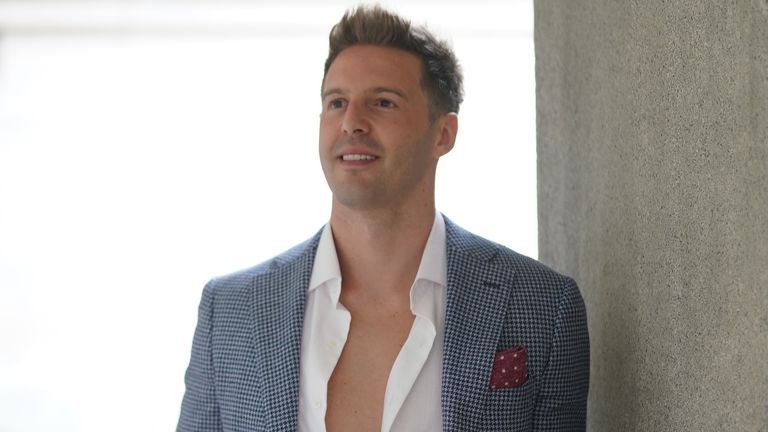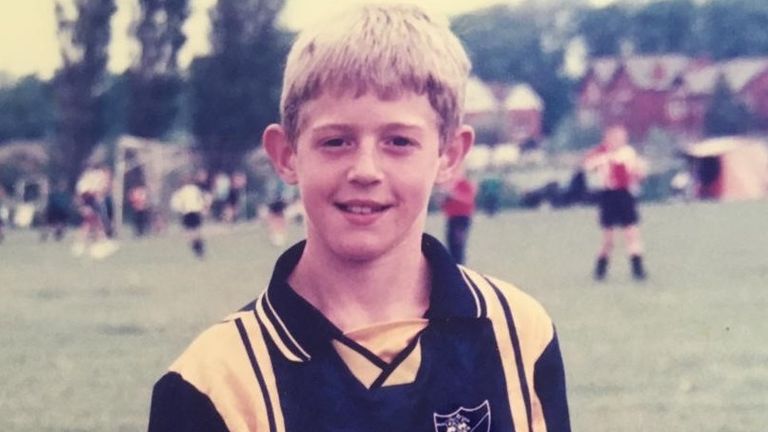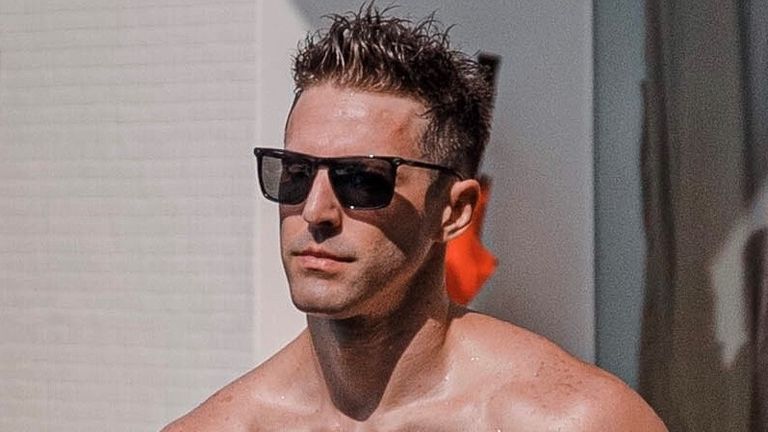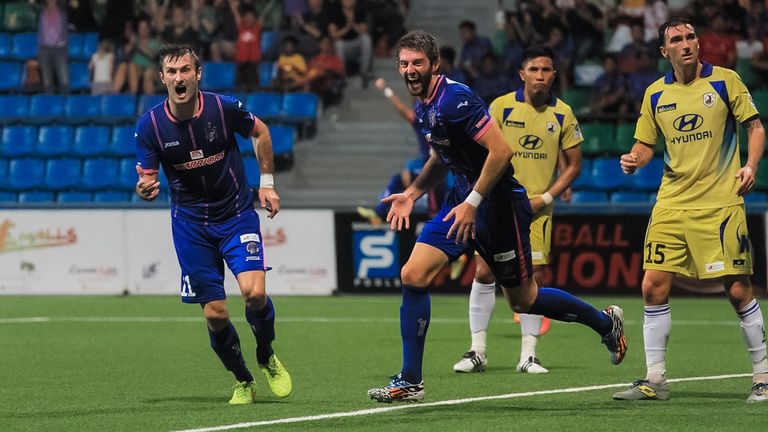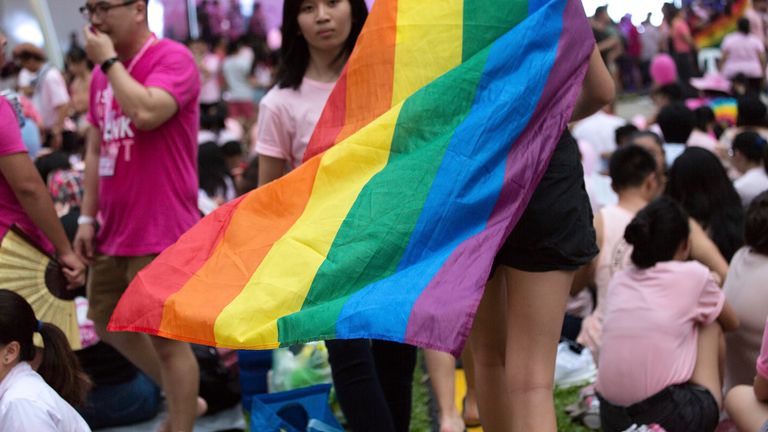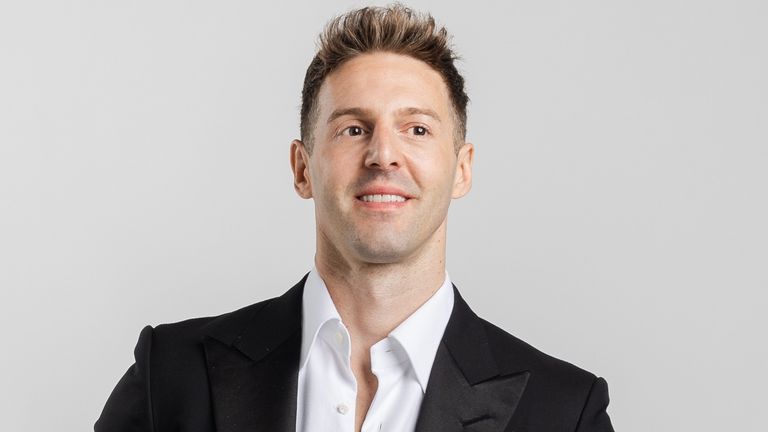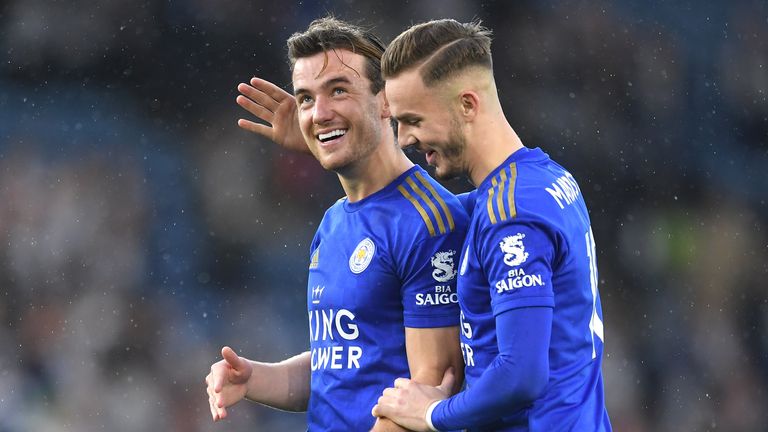Thomas Beattie: Football distracted me from accepting I'm gay
Sharing his story of being a gay footballer has been "liberating" for Thomas Beattie. He talks to Sky Sports about mental health, the injury that ended his playing career, and finding a sense of Pride
Sunday 28 June 2020 17:48, UK
Thomas Beattie made an extraordinary decision in men's football a few days ago, generating headlines around the world.
However, by sharing publicly that he's gay, Beattie - who rose through the Academy ranks at Hull City before playing professionally in Canada, the United States and Singapore - hopes to help make the act of coming out more ordinary for any male players who might relate to his story.
The 33-year-old knows that for many people, his news won't be considered particularly remarkable. Beattie is not well known among football fans in his native England and he retired from playing five years ago. Yet for a footballer in the closet - a place where mental health challenges can become suffocating - his words could be just what they need to hear.
"It's still something that people look at and think, 'why don't they just do it? I don't know why they're talking about it'," says Beattie, talking to Sky Sports from Singapore, where he has lived since 2012.
"But the perspective is different for a gay athlete. There are so many mental obstacles you go around, trying to figure out these things from the inside. It feels very different to how it probably looks on the outside."
Beattie was a talented attacking midfielder who was on the verge of breaking through at his local club but turned away from the opportunity when it presented itself.
In his story released via ESPN and The Advocate on Tuesday, he described the confusion he felt as a teenager. "I was struggling, but I couldn't articulate why... I wanted to be as far away as I could." A scholarship in the US was suggested, and he leapt at the chance. He thrived at Limestone College in South Carolina, completing a degree and claiming All-American college athlete honours, the Saints soccer team's first-ever player to do so.
While Hull were preparing for their debut Premier League campaign, Beattie returned to Europe and was set to sign for Sandefjord in Norway. He soon realised he had made a mistake - the environment felt uncomfortable, and again he couldn't explain why, least of all to himself. The 21-year-old asked his agent to arrange something else, and a stint on trial at Kilmarnock followed. They offered him a one-year-deal; he turned it down. "All I wanted to do was hide."
Returning to North America was the best option. He signed up for the Canadian Soccer League, spending a season in London - just across the border between Detroit and Toronto - before then moving on again to Ottawa Fury, where he was made captain. As a young man in his 20s, Beattie became adept at projecting an image of confidence and assurance. Away from football, he was his own worst company.
"I understood I was different from the rest of my friends, but I never really could pinpoint what it was. I didn't want to dive deeper and self-analyse that, because that process was pretty daunting to even consider," he explains.
The game became the perfect distraction. "When you're playing and training, you're in this zone of 'nothing else matters'. You're completely engulfed in what's going on. It consumes you. The more I played, the more it allowed me to escape.
"But it was almost an anti-climax - you go from that euphoria to nothing, and then you get that ultimate sense of loneliness. It was a balancing act, trying to figure it all out. Is this helping me, or is it not? But football was all I knew, all I've ever loved. I'm still grateful for it now, but it left me in a position at times of feeling quite lonely."
Moving to Asia, injury agony - and self-acceptance
Soon after his 26th birthday, Beattie was on the move again, switching to the Singapore S-League. At Hougang United, he impressed his English coach Alex Weaver enough that when the latter was hired by the country's most successful club, Warriors F.C., he went back to sign Beattie again. As coach and captain, they won the league together in 2014, which also resulted in qualification for the Asian Champions League.
However, deep into the following S-League season, the midfielder suffered a life-threatening injury when a clash of heads left him with a brain haemorrhage and extensive facial fractures.
The injury forced him to retire from playing, aged just 29. He refers to it now as his "beautiful nightmare" - a painful point in time that jolted him out of his denial, and tore away the cover of football. He finally had no choice but to look at himself. "It was a good time for me. I was in this space of knowing who I am but I was never really going to allow myself to accept it.
"The injury set me free, in that my perspective changed. It made me think that life is short, and tomorrow is not promised. For me to wait or live life on someone else's terms was not going to be an option. It forced me into a space which now I'm very grateful for."
Upon recovery, Beattie stayed in Singapore and threw himself into the business world, becoming a digital entrepreneur. His off-field profile was on the rise, along with his self-acceptance. Then in 2019, he was named one of the country's most eligible bachelors in an annual competition run by a popular women's magazine. Having successfully hidden himself away within football for many years, he suddenly found himself publicly pretending to be someone he's not.
"It was definitely something that I could have done without," he says. "It was around that time that I started thinking this is not going to be a long-term thing for me. I thought, I can't be living in this space. And I didn't need to be either. I had no one else to answer to, so the only obstacle that was ahead of me was myself."
Perhaps in the past, Beattie might have run away to a new country, and started over again. However, being an entrepreneur requires a different level of commitment to football, and Singapore has always felt like home - even if LGBT+ rights are not yet as advanced there as in western nations. "It's fairly open and accepting. There may not be equal marriage yet, but they're not naïve to the fact that being gay isn't a choice."
He cleared the first obstacle by coming out to "a few friends and family", and was met with positive reactions - but having a big network of friends and contacts through both football and business brings complications. "I started to get asked by certain people and I felt like I was coming out on a daily basis - it was really exhausting. I thought, I'd rather do this in one fell swoop, and find some purpose in it."
Friends in the entertainment industry gave Beattie advice and support, and inspiration was also provided in part by another Yorkshireman, rugby league's Keegan Hirst, who came out publicly in a newspaper interview in 2015. "Everyone's journey's different, but Keegan was also in a very masculine physical sport - he went through the fire and came out doing OK. He's someone whose story really resonated with me and offered some motivation for me to do the same."
Hirst has recently launched his own personal online coaching service and, like Beattie, keeps himself in great shape. Posting the occasional shirtless selfie has helped both men to build big Instagram audiences, but Beattie - who now has over 300,000 followers on the platform - isn't exactly sold on social media.
When he was navigating his way towards coming out, it became yet another obstacle, as his posts became increasingly popular with both male and female admirers. "It brings more spotlight on you, and you start to feel you need to address things which are difficult to talk about. You almost become your own worst enemy - you attract attention but then it's attention you don't want to talk about.
"At times it left me feeling like, why have I put myself in this position? The culture around that can be quite overwhelming.
"I used to censor a lot of the comments which came in. It took up a lot of my time and energy. Any time I posted a picture, I had to be in a space where I had no meetings and no obligations because for the next two hours, I felt I needed to be sat by my phone to police these comments.
"Obviously I was always self-conscious about the ones that were coming in from people who I assumed might be gay, so I would hide them or delete them."
On Tuesday, Beattie posted a smiling selfie from a favourite photoshoot - shirt on, confident pose. "I try to think of myself as not living in these two worlds anymore. They've just slowly blended together, and the people that matter to me are in both." In the message, he wrote: "I am a brother, son, friend and I'm gay. It took me a long time to accept who I am and I hope it is a little easier for the next generation."
Fellow out athletes Anton Hysen and Ian Thorpe posted amid a flood of support; significantly, the Singapore Premier League's official account replied with a heart emoji.
Masculinity, the media, and mental health
The "fell swoop" is finished, but for Beattie, the purpose has only just begun. Within hours of his story being published, messages began to arrive from across the world. "Many are from young people in difficult situations, such as living with parents who they fear might chuck them out of the house. Others say they've been sent to conversion therapy. It's volatile and fragile when you're at a certain stage of life." This weekend is Global Pride, a virtual festival being marked worldwide on the anniversary of the start of the Stonewall Riots - the birth of the modern-day LGBT+ rights movement. "It's a good time to share," says Beattie. "Even if adds just a little bit of solidarity."
As for football and creating a culture where gay and bi players don't feel they have to hide that part of who they are, he knows the conversation is complex. "The game is getting better at looking at ways to help on mental health but I think the LGBT+ community is one thing that's been missing.
"Football's a very masculine sport - it's played and watched by typically very masculine guys, and society over time has told us that masculinity and sexuality are linked. We know these two things are in no way linked, the same as femininity and sexuality - I know some of the most feminine straight guys in the world! But that's the perspective from the outside and people still don't really know how to approach that."
Beattie is sure homophobic language was occasionally used in and around dressing rooms when he was playing, but he doesn't recall specifics - "I felt that it didn't apply to me, so it just went over my head" - and it's his former team-mates who have sent some of the most supportive messages. "It's been overwhelming. Looking back, I probably could have had a conversation with them about it but I just wasn't ready at the time."
He gives short shrift to the oft-mooted suggestion that it might be easier for gay or bi male footballers to come out together, as a group. "If you'd have brought that to me, I'd have walked out of the room. It's your own personal journey - it needs to feel right, on your own terms and in your own time." He's encouraged by reports of more inclusive relationships education now provided in UK schools and academies, and positive storylines about footballers who are gay such as those seen recently on TV in Coronation Street and CBBC football drama Jamie Johnson.
Greater sensitivity from the media would be impactful too, he feels. "Certain words and terminology - such as saying a gay player is 'terrified' to come out - it scares people and puts them in a space where they don't feel like they can even go through that process. Empowering people, as opposed to instilling fear, would definitely be beneficial."
There are over 5,000 professional male players in British football, and many more at semi-pro and amateur level. What would be his message to those in the closet? "I'd say, just know that you're not alone. But I wouldn't tell anybody to just come out - it would be naive of me to do that. You need to understand where you are in your career, what country you're playing in, the laws there... and everyone's journey is different.
"Try to find at least one or two people around you who understand what you're going through. Family members can be quite hard to speak to, from experience, and even close friends - I think our closest friends can be the hardest ones to tell, because they know you in a certain light for so many years, and there's that mental picture of you changing. That can be quite daunting.
"Sport can be a massive way to distract yourself, but there is going to come a point where you almost implode. It's healthy to have somebody you can lean on and talk to."
The modern-day visibility of Pride sometimes gives the illusion that sexuality is simple nowadays - 'love is love,' 'be yourself', and similar slogans. Amid that positivity, Beattie's account provides a rare glimpse behind the mental wall built up by professional footballers - essential for character, fortitude, and resilience - but which keeps their more vulnerable emotions concealed from view. Some outside of that headspace might say 'who cares?' about the prospect of a male player being gay or bi. Yet for such a player, caring too much about what other people think could hold him back from achieving all he is capable of.
"For me now, I know that my productivity was massively boosted when I really understood who I was," says Beattie. "If I'd had that moment while I was an athlete, I think it would have been quite powerful and invigorating. And in terms of my performance, it would have helped." For that confused, football-mad teenager who once left a Hull City contract unsigned, that moment could have been life-changing.
Sky Sports is a member of TeamPride which supports Stonewall's Rainbow Laces campaign. If you'd like to inspire others in sport by sharing your own story of being LGBT+ or an ally, please contact us here.
